Minjin Choi
DIFF: Dual Side-Information Filtering and Fusion for Sequential Recommendation
May 20, 2025Abstract:Side-information Integrated Sequential Recommendation (SISR) benefits from auxiliary item information to infer hidden user preferences, which is particularly effective for sparse interactions and cold-start scenarios. However, existing studies face two main challenges. (i) They fail to remove noisy signals in item sequence and (ii) they underutilize the potential of side-information integration. To tackle these issues, we propose a novel SISR model, Dual Side-Information Filtering and Fusion (DIFF), which employs frequency-based noise filtering and dual multi-sequence fusion. Specifically, we convert the item sequence to the frequency domain to filter out noisy short-term fluctuations in user interests. We then combine early and intermediate fusion to capture diverse relationships across item IDs and attributes. Thanks to our innovative filtering and fusion strategy, DIFF is more robust in learning subtle and complex item correlations in the sequence. DIFF outperforms state-of-the-art SISR models, achieving improvements of up to 14.1% and 12.5% in Recall@20 and NDCG@20 across four benchmark datasets.
Linear Item-Item Model with Neural Knowledge for Session-based Recommendation
Apr 21, 2025
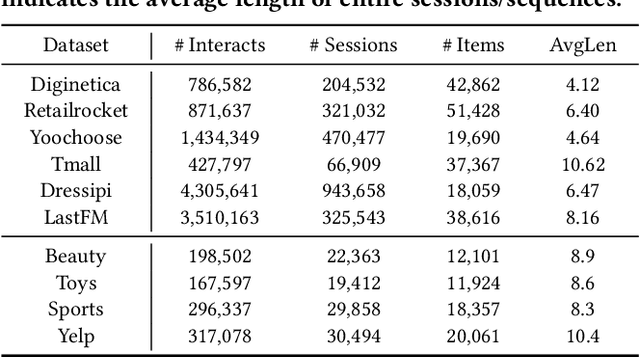
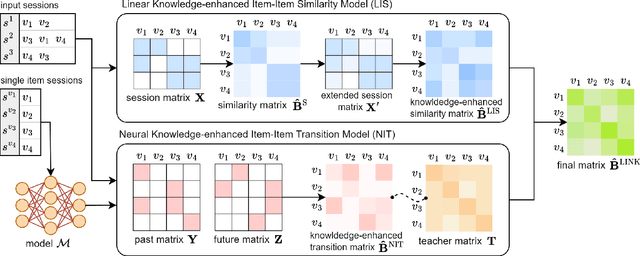
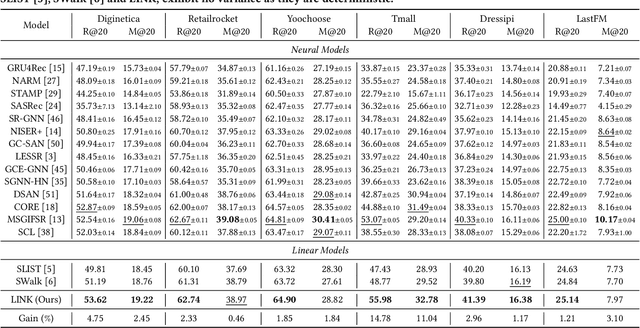
Abstract:Session-based recommendation (SBR) aims to predict users' subsequent actions by modeling short-term interactions within sessions. Existing neural models primarily focus on capturing complex dependencies for sequential item transitions. As an alternative solution, linear item-item models mainly identify strong co-occurrence patterns across items and support faster inference speed. Although each paradigm has been actively studied in SBR, their fundamental differences in capturing item relationships and how to bridge these distinct modeling paradigms effectively remain unexplored. In this paper, we propose a novel SBR model, namely Linear Item-Item model with Neural Knowledge (LINK), which integrates both types of knowledge into a unified linear framework. Specifically, we design two specialized components of LINK: (i) Linear knowledge-enhanced Item-item Similarity model (LIS), which refines the item similarity correlation via self-distillation, and (ii) Neural knowledge-enhanced Item-item Transition model (NIT), which seamlessly incorporates complicated neural knowledge distilled from the off-the-shelf neural model. Extensive experiments demonstrate that LINK outperforms state-of-the-art linear SBR models across six real-world datasets, achieving improvements of up to 14.78% and 11.04% in Recall@20 and MRR@20 while showing up to 813x fewer inference FLOPs. Our code is available at https://github.com/jin530/LINK.
Temporal Linear Item-Item Model for Sequential Recommendation
Dec 10, 2024



Abstract:In sequential recommendation (SR), neural models have been actively explored due to their remarkable performance, but they suffer from inefficiency inherent to their complexity. On the other hand, linear SR models exhibit high efficiency and achieve competitive or superior accuracy compared to neural models. However, they solely deal with the sequential order of items (i.e., sequential information) and overlook the actual timestamp (i.e., temporal information). It is limited to effectively capturing various user preference drifts over time. To address this issue, we propose a novel linear SR model, named TemporAl LinEar item-item model (TALE), incorporating temporal information while preserving training/inference efficiency, with three key components. (i) Single-target augmentation concentrates on a single target item, enabling us to learn the temporal correlation for the target item. (ii) Time interval-aware weighting utilizes the actual timestamp to discern the item correlation depending on time intervals. (iii) Trend-aware normalization reflects the dynamic shift of item popularity over time. Our empirical studies show that TALE outperforms ten competing SR models by up to 18.71% gains on five benchmark datasets. It also exhibits remarkable effectiveness in evaluating long-tail items by up to 30.45% gains. The source code is available at https://github.com/psm1206/TALE.
From Reading to Compressing: Exploring the Multi-document Reader for Prompt Compression
Oct 05, 2024



Abstract:Large language models (LLMs) have achieved significant performance gains using advanced prompting techniques over various tasks. However, the increasing length of prompts leads to high computational costs and often obscures crucial information. Prompt compression has been proposed to alleviate these issues, but it faces challenges in (i) capturing the global context and (ii) training the compressor effectively. To tackle these challenges, we introduce a novel prompt compression method, namely Reading To Compressing (R2C), utilizing the Fusion-in-Decoder (FiD) architecture to identify the important information in the prompt. Specifically, the cross-attention scores of the FiD are used to discern essential chunks and sentences from the prompt. R2C effectively captures the global context without compromising semantic consistency while detouring the necessity of pseudo-labels for training the compressor. Empirical results show that R2C retains key contexts, enhancing the LLM performance by 6% in out-of-domain evaluations while reducing the prompt length by 80%.
MARS: Matching Attribute-aware Representations for Text-based Sequential Recommendation
Sep 04, 2024Abstract:Sequential recommendation aims to predict the next item a user is likely to prefer based on their sequential interaction history. Recently, text-based sequential recommendation has emerged as a promising paradigm that uses pre-trained language models to exploit textual item features to enhance performance and facilitate knowledge transfer to unseen datasets. However, existing text-based recommender models still struggle with two key challenges: (i) representing users and items with multiple attributes, and (ii) matching items with complex user interests. To address these challenges, we propose a novel model, Matching Attribute-aware Representations for Text-based Sequential Recommendation (MARS). MARS extracts detailed user and item representations through attribute-aware text encoding, capturing diverse user intents with multiple attribute-aware representations. It then computes user-item scores via attribute-wise interaction matching, effectively capturing attribute-level user preferences. Our extensive experiments demonstrate that MARS significantly outperforms existing sequential models, achieving improvements of up to 24.43% and 29.26% in Recall@10 and NDCG@10 across five benchmark datasets. Code is available at https://github.com/junieberry/MARS
Multi-intent-aware Session-based Recommendation
May 02, 2024Abstract:Session-based recommendation (SBR) aims to predict the following item a user will interact with during an ongoing session. Most existing SBR models focus on designing sophisticated neural-based encoders to learn a session representation, capturing the relationship among session items. However, they tend to focus on the last item, neglecting diverse user intents that may exist within a session. This limitation leads to significant performance drops, especially for longer sessions. To address this issue, we propose a novel SBR model, called Multi-intent-aware Session-based Recommendation Model (MiaSRec). It adopts frequency embedding vectors indicating the item frequency in session to enhance the information about repeated items. MiaSRec represents various user intents by deriving multiple session representations centered on each item and dynamically selecting the important ones. Extensive experimental results show that MiaSRec outperforms existing state-of-the-art SBR models on six datasets, particularly those with longer average session length, achieving up to 6.27% and 24.56% gains for MRR@20 and Recall@20. Our code is available at https://github.com/jin530/MiaSRec.
GLEN: Generative Retrieval via Lexical Index Learning
Nov 06, 2023



Abstract:Generative retrieval shed light on a new paradigm of document retrieval, aiming to directly generate the identifier of a relevant document for a query. While it takes advantage of bypassing the construction of auxiliary index structures, existing studies face two significant challenges: (i) the discrepancy between the knowledge of pre-trained language models and identifiers and (ii) the gap between training and inference that poses difficulty in learning to rank. To overcome these challenges, we propose a novel generative retrieval method, namely Generative retrieval via LExical iNdex learning (GLEN). For training, GLEN effectively exploits a dynamic lexical identifier using a two-phase index learning strategy, enabling it to learn meaningful lexical identifiers and relevance signals between queries and documents. For inference, GLEN utilizes collision-free inference, using identifier weights to rank documents without additional overhead. Experimental results prove that GLEN achieves state-of-the-art or competitive performance against existing generative retrieval methods on various benchmark datasets, e.g., NQ320k, MS MARCO, and BEIR. The code is available at https://github.com/skleee/GLEN.
ConQueR: Contextualized Query Reduction using Search Logs
May 22, 2023



Abstract:Query reformulation is a key mechanism to alleviate the linguistic chasm of query in ad-hoc retrieval. Among various solutions, query reduction effectively removes extraneous terms and specifies concise user intent from long queries. However, it is challenging to capture hidden and diverse user intent. This paper proposes Contextualized Query Reduction (ConQueR) using a pre-trained language model (PLM). Specifically, it reduces verbose queries with two different views: core term extraction and sub-query selection. One extracts core terms from an original query at the term level, and the other determines whether a sub-query is a suitable reduction for the original query at the sequence level. Since they operate at different levels of granularity and complement each other, they are finally aggregated in an ensemble manner. We evaluate the reduction quality of ConQueR on real-world search logs collected from a commercial web search engine. It achieves up to 8.45% gains in exact match scores over the best competing model.
S-Walk: Accurate and Scalable Session-based Recommendationwith Random Walks
Jan 04, 2022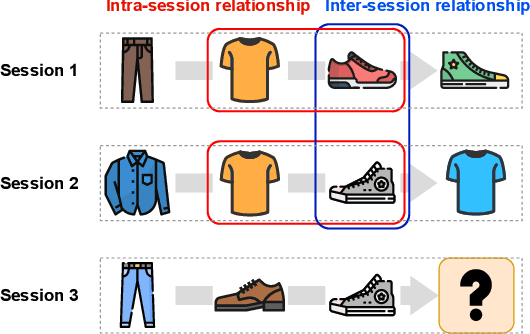
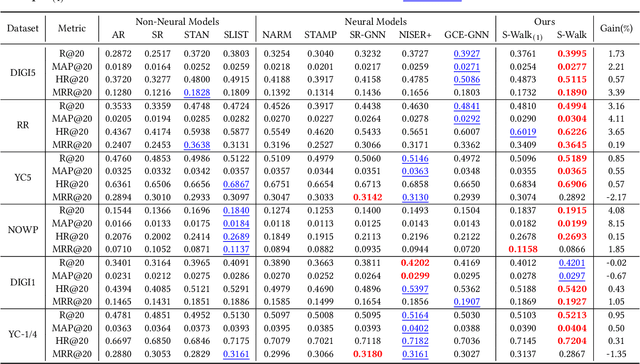

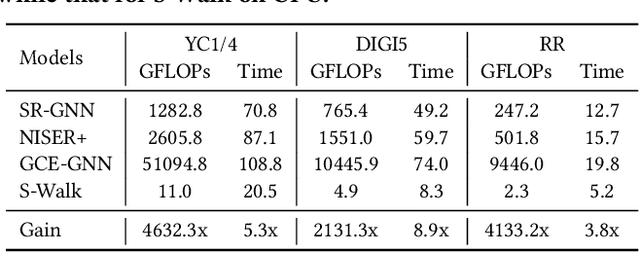
Abstract:Session-based recommendation (SR) predicts the next items from a sequence of previous items consumed by an anonymous user. Most existing SR models focus only on modeling intra-session characteristics but pay less attention to inter-session relationships of items, which has the potential to improve accuracy. Another critical aspect of recommender systems is computational efficiency and scalability, considering practical feasibility in commercial applications. To account for both accuracy and scalability, we propose a novel session-based recommendation with a random walk, namely S-Walk. Precisely, S-Walk effectively captures intra- and inter-session correlations by handling high-order relationships among items using random walks with restart (RWR). By adopting linear models with closed-form solutions for transition and teleportation matrices that constitute RWR, S-Walk is highly efficient and scalable. Extensive experiments demonstrate that S-Walk achieves comparable or state-of-the-art performance in various metrics on four benchmark datasets. Moreover, the model learned by S-Walk can be highly compressed without sacrificing accuracy, conducting two or more orders of magnitude faster inference than existing DNN-based models, making it suitable for large-scale commercial systems.
MelBERT: Metaphor Detection via Contextualized Late Interaction using Metaphorical Identification Theories
Apr 28, 2021



Abstract:Automated metaphor detection is a challenging task to identify metaphorical expressions of words in a sentence. To tackle this problem, we adopt pre-trained contextualized models, e.g., BERT and RoBERTa. To this end, we propose a novel metaphor detection model, namely metaphor-aware late interaction over BERT (MelBERT). Our model not only leverages contextualized word representation but also benefits from linguistic metaphor identification theories to distinguish between the contextual and literal meaning of words. Our empirical results demonstrate that MelBERT outperforms several strong baselines on four benchmark datasets, i.e., VUA-18, VUA-20, MOH-X, and TroFi.
 Add to Chrome
Add to Chrome Add to Firefox
Add to Firefox Add to Edge
Add to Edge